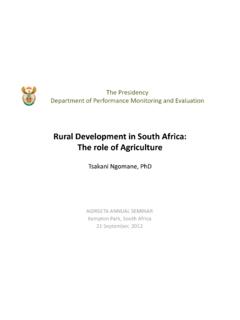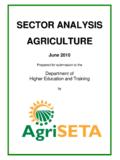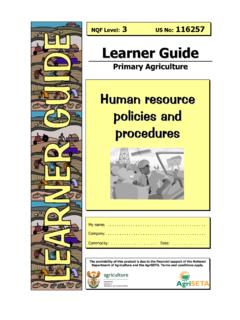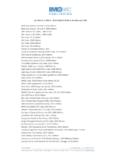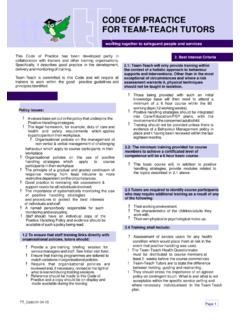Transcription of Learner Guide - AgriSeta
1 NQF Level: 2 US No: 116111. Learner Guide Primary Agriculture H a r v e s t Ag r i c u l t u r a l Cr o ps My name: .. Company: .. Commodity: .. Date: .. The availability of this product is due to the financial support of the National Department of Agriculture and the AgriSeta . Terms and conditions apply. Harvest Agricultural Crops: Procedures 2. Primary Agriculture NQF Level 2 Unit Standard No: 116111. Before we start . Dear Learner - This Learner Guide contains all the information to acquire all the knowledge and skills leading to the unit standard: Title: Harvest Agricultural Crops: Procedures US No: 116111 NQF Level: 2 Credits: 4. The full unit standard will be handed to you by your facilitator. Please read the unit standard at your own time. Whilst reading the unit standard, make a note of your questions and aspects that you do not understand, and discuss it with your facilitator.
2 This unit standard is one of the building blocks in the qualifications listed below. Please mark the qualification you are currently doing: Title ID Number NQF Level Credits Mark National Certificate in Animal Production 48976 2 120. National Certificate in Mixed Farming Systems 48977 2 120. National Certificate in Plant Production 48975 2 120. Are you enrolled in a: Y N. Please mark the learning program you Learnership? are enrolled in: Skills Program? Your facilitator should explain the above Short Course? concepts to you. This Learner Guide contains all the information, and more, as well as the activities that you will be expected to do during the course of your study. Please keep the activities that you have completed and include it in your Portfolio of Evidence. Your PoE will be required during your final assessment. This Learner Guide contains all the information, and more, as well as the activities that you will be expected to do during the course of your study.
3 Please keep the activities that you have completed and include it in your Portfolio of Evidence. Your PoE will be required during your final assessment. What is assessment all about? You will be assessed during the course of your study. This is called formative assessment. You will also be assessed on completion of this unit standard. This is called summative assessment. Before your assessment, your assessor will discuss the unit standard with you. Assessment takes place at different intervals of the learning process and includes various activities. Some activities will be done before the commencement of the Version: 01 Version Date: July 2006. Harvest Agricultural Crops: Procedures 3. Primary Agriculture NQF Level 2 Unit Standard No: 116111. program whilst others will be done during programme delivery and other after completion of the program. The assessment experience should be user friendly, transparent and fair.
4 Should you feel that you have been treated unfairly, you have the right to appeal. Please ask your facilitator about the appeals process and make your own notes. How to use the activity sheets . Your activities must be handed in from time to time on request of the facilitator for the following purposes: The activities that follow are designed to help you gain the skills, knowledge and attitudes that you need in order to become competent in this learning module. It is important that you complete all the activities and worksheets, as directed in the Learner Guide and at the time indicated by the facilitator. It is important that you ask questions and participate as much as possible in order to play an active roll in reaching competence. When you have completed all the activities and worksheets, hand this workbook in to the assessor who will mark it and Guide you in areas where additional learning might be required.
5 You should not move on to the next step in the assessment process until this step is completed, marked and you have received feedback from the assessor. Sources of information to complete these activities should be identified by your facilitator. Please note that all completed activities, tasks and other items on which you were assessed must be kept in good order as it becomes part of your Portfolio of Evidence for final assessment. Enjoy this learning experience! Version: 01 Version Date: July 2006. Harvest Agricultural Crops: Procedures 4. Primary Agriculture NQF Level 2 Unit Standard No: 116111. How to use this Guide . Throughout this Guide , you will come across certain re-occurring boxes . These boxes each represent a certain aspect of the learning process, containing information, which would help you with the identification and understanding of these aspects.
6 The following is a list of these boxes and what they represent: What does it mean? Each learning field is characterized by unique terms and definitions it is important to know and use these terms and definitions correctly. These terms and definitions are highlighted throughout the Guide in this manner. You will be requested to complete activities, which could be group activities, or individual activities. Please remember to complete the activities, as the facilitator will assess it and these will become part of your portfolio of evidence. Activities, whether group or individual activities, will be described in this box. Examples of certain The following box indicates a summary of concepts or principles to concepts that we have covered, and offers help you contextualise you an opportunity to ask questions to your them easier, will be shown facilitator if you are still feeling unsure of in this box.
7 The concepts listed. My Notes . You can use this box to jot down questions you might have, words that you do not understand, instructions given by the facilitator or explanations given by the facilitator or any other remarks that will help you to understand the work better.. Version: 01 Version Date: July 2006. Harvest Agricultural Crops: Procedures 5. Primary Agriculture NQF Level 2 Unit Standard No: 116111. What are we going to learn? What will I be able to do? .. 6. Learning outcomes 6. What do I need to know? .. 6. Introduction 6. Session 1 Pre-determined harvesting method .. 7. Session 2 Sampling for maturity . 19. Session 3 Harvest .. 25. Session 4 Health, hygiene and safety measures .. 32. Session 5 Disposal of waste .. 39. Glossary .. 43. Am I ready for my test? .. 44. Checklist for Practical assessment .. 46. Paperwork to be done .. 47. Bibliography.
8 48. Terms and conditions .. 48. Acknowledgements .. 49. SAQA Unit Standards Version: 01 Version Date: July 2006. Harvest Agricultural Crops: Procedures 6. Primary Agriculture NQF Level 2 Unit Standard No: 116111. What will I be able to do? When you have achieved this unit standard, you will be able to: Harvest crops according to basic procedures making use of basic harvesting tools. Gain specific knowledge and skills in harvesting techniques. Operate in a plant production environment implementing sustainable and economically viable production principles. Learning Outcomes At the end of this learning module, you must is able to demonstrate a basic knowledge and understanding of: The principles of harvesting a crop. Names and functions of tools and materials for the harvesting process. Safe handling procedures of tools and materials utilised. The various harvesting methods.
9 Plant physiology and anatomy required for the harvesting of different crops. Importance of harvesting area being clean from waste material. Occupational Health and Safety and other applicable legislation. Use of sensory cues to show harvest readiness. What do I need to know? It is expected of the Learner attempting this unit standard to demonstrate competence against the unit standard: It is assumed that the Learner has successfully completed the unit standards listed below: NQF Level 1; 116201; Harvest agricultural crops. NQF Level 1; 116156; Collect agricultural data. NQF Level 2; 116060; Utilize and perform minor repair and maintenance tasks on implements, equipment and infrastructure. Introduction After you have taken care of the crop plants during the growing season, the produce has to be harvested and income generated by the selling thereof. Harvesting is as important as applying enough water and fertilizers, as any mistakes made at this stage can render all the inputs made up to harvesting ineffective.
10 Therefore it is important to know your crop and its needs to produce a good yield, know when to harvest, what procedures to follow and what tools and equipment to use during harvest. Version: 01 Version Date: July 2006. Harvest Agricultural Crops: Procedures 7. Primary Agriculture NQF Level 2 Unit Standard No: 116111. Session 1 Pr e - de t e r mi n e d h a r v e s t i n g m e t h od After completing this session, you should be able to: SO 1: Select and use appropriate tools / equipment for pre- determined harvesting method. SO 6: Care and maintain equipment used in cooperation with, and guiding others. In this session we explore the following concepts: Harvesting methods. Harvesting tools and equipment. Care for harvesting tools and equipment. Clean and maintain harvest tools and equipment. Safe and correct use of tools and equipment. Report and record problems experienced during harvesting.
